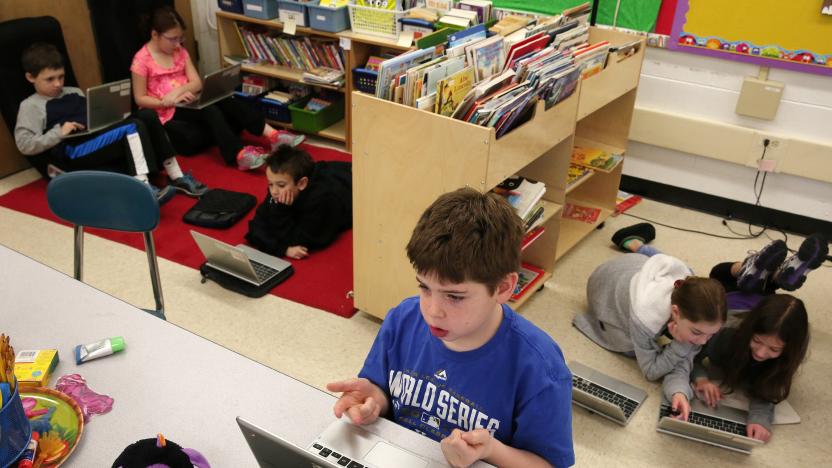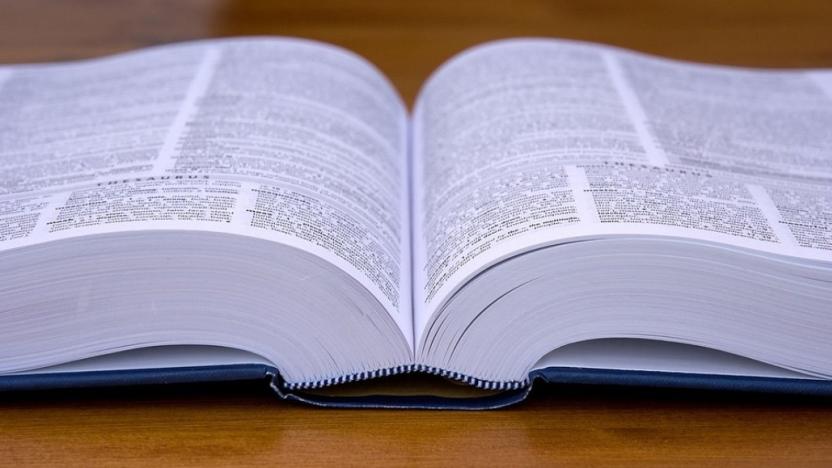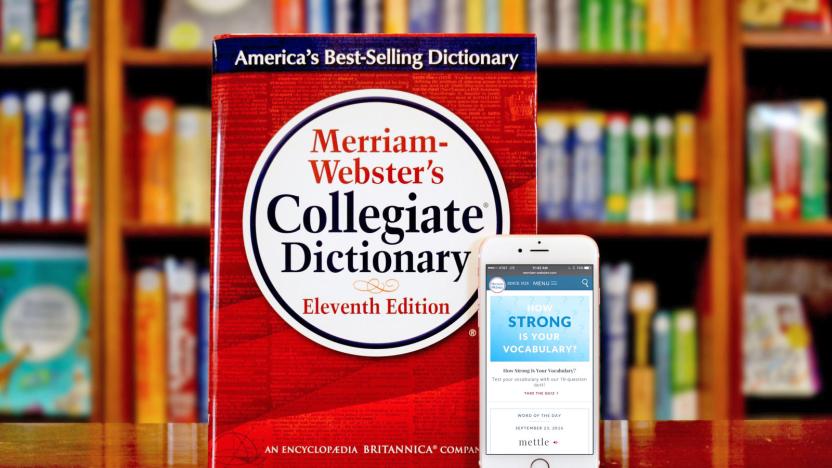dictionary
Latest

Google Play Books update brings audio narration to kids titles
Google is adding new audio resource tools to children's ebooks on Play Books including a kid-friendly dictionary and a bigger selection of audiobooks.

Google will help you pronounce difficult words
Google wants to make it easier to learn word pronunciations. Today, it introduced a new Search feature that will let users practice saying tricky words. When you look up a pronunciation, Google will provide an answer, and when you say the word into your phone's microphone, Search will let you know if you said it correctly.

'Bingeable,' 'biohacking' and 'fintech' are now officially words
To say that the internet has played a massive role in the shaping of global society is a bit of an understatement, really, but one area that often gets overlooked is its influence on language. Thanks to teh interwebz (bear with me), we're all exposed to words, phrases and spellings from languages and subcultures we might never have access to otherwise, and this has opened up a whole world of linguistic joy (and loathing). Today, Merriam-Webster has added more than 840 new entries to its dictionary, a step in the continuous process of recording our ever-expanding language.

CRISPR, 'binge-watch' and 'botnet' are now in the dictionary
The vocabulary experts who decide which terms get added to the Merriam-Webster's Dictionary are at it again. Today, over 1,000 new words made the cut from fields like science, tech, medicine pop culture, sports and more. Among the new additions are CRISPR, botnet and binge-watch alongside microbiome, truther, SCOTUS and FLOTUS. Other notable new entries include Seussian -- of, relating to, or suggestive of the works of Dr. Seuss -- and the technical term for the inability to recognize faces: prosopagnosia. Merriam-Webster doesn't publish the full list of new additions, but you can take a brief survey via the source link below.

Oxford Dictionaries' Word of the Year is... an emoji
Oxford Dictionaries' Word of the Year is as much about capturing the cultural zeitgeist as it is reflecting the evolution of the English language, and that's truer than ever in 2015. For the first time ever, the institution chose emoji (the "tears of joy" icon you see above) to win the honor -- yes, actual words lost out. It's an odd decision, to put it mildly, but Oxford notes that the use of the word "emoji" more than tripled in the space of the past year, and the tears image was the most popular emoji worldwide.

WTF, 'Clickbait' and 'Emoji' are now officially words?
As the English language continues to evolve in response the internet's cultural onslaught, Merriam-Webster has announced that it's adding a host of new net-centric terms to its pages. In fact, the dictionary company has recently added a total of 1,700 terms to its word repository. Among them: net neutrality, click fraud, meme, photobomb, NSFW and a host of other words your kids have already been using for years. Numerous other, non-technical words made their way into Merriam-Webster Unabridged as well including jegging, crema, and colossal squid.

The copy of the U.S. Constitution that's installed on every Mac
Sometimes when I see just how ignorant many American politicians are of the Constitution of the United States, I get the urge to send them a copy along with some annotations. Perhaps now that more of those in the federal government are using Macs, we might begin to see them paying more attention to this document that outlines the supreme law of the land. Why? Well, there's a copy of the U.S. Constitution on each and every Mac in the Dictionary app. To see this information from The New Oxford American Dictionary, just launch the Dictionary app from your Applications folder. Once it's up and running, go up to the menu bar and select Go > Front/Back Matter. There you'll not only find such exciting information as who was on the editorial staff and advisory board for the Dictionary, but also a bunch of useful references. In addition to the aforementioned Constitution of the United States of America, there's also a complete Language Guide, a history of the English language, a list of the fifty states and each state capital, a list of every President of the U.S. from George Washington to George W. Bush (not sure what happened to the current incumbent...), the Declaration of Independence, a list of countries of the world, a list of chemical elements from hydrogen to meitnerium, a cross-reference of standard to metric measure conversions, and the Arabic, Hebrew, Greek and Russian alphabets. Sure, it's not exactly Wikipedia, but it's sure nice to know that if you're offline and just happen to need to know what the 21st Amendment to the Constitution did (it repealed Prohibition), you've got it at your fingertips.

Totes amazeballs added to the dictionary, because YOLO
When dictionary makers use internet slang, we always feel the same as if our parents had gotten a Justin Bieber tattoo. Chambers Dictionary is the latest wordy tome to get an update for 2014, which now includes YOLO, Bitcoin and totes amazeballs as words and phrases it's acceptable to use in your homework. It's not just digital neologisms that have made the cut this time around, since the 13th edition also includes words such as schemie (someone who lives on a council estate), hipsters (self-hating members of the middle class) and f**kbuddy (a very, very good friend). Still no mention for Chumbumble, a word we invented purely to protest dictionaries trying to be cool, but there's always the 14th edition.

The words hashtag, steampunk and selfie are now tired enough to go in the dictionary
There's something in the water over on lexicography boulevard. Just a day after Collins asked Twitter users to vote on a new word, Merriam-Webster has revealed which internet-born terms it now considers official. The 150 strong list includes crowdfunding, selfie and hashtag, all the way through to more cultural ones like catfish, tweep and steampunk. Just think, you can use all six of those words in a term paper and your teacher can't be mad at you, because, duh, they're all in the dictionary.

Should 'Adorkable' 'Duckface' or 'Nomakeupselfie' be added to the dictionary?
How does the fusty council of elders that compose Collins' English Dictionary spend their time? Just like the rest of us, they're messing around on Twitter. In preparation for the twelfth edition of the tome, its creators have asked the site's users to vote for one of nine words to become an official part of the English language, just like sext and selfie. The options run from Gaybourhood (a Gay-friendly neighborhood), through Felfie (farmer-selfie), Duckface (don't make us explain this one) to Euromaidan (a pro-European protestor from Ukraine). You'll be able to vote between now and May 28th, after which we're going to commence a campaign to get the word Chumbumble, which we just invented, into the thirteenth edition.

Google expands word definition box, makes looking up ten-dollar words easier
Here's one for the logophiles and the voracious readers: searching for words on Google now returns more than their definitions. So, next time you look up a fancy term, the definition box will also contain its synonyms, sample sentences and a drop-down menu that can translate the word into another language. The new results even give you a glimpse of a word's origins and show a graph of how commonly it's used over time. While a relatively minor update, it's boosted by the addition of a new voice function: when you tap on the Search microphone and ask questions such as "What is the definition of / What are the synonyms of [a word]," a voice will read the first result out loud. All these features are now active on both desktops and Google's mobile Search apps in the US, ready to lend a hand during weekend Scrabble parties.

Mac 101: Mountain Lion's Magic Trackpad triple-finger tap dictionary lookup
Let's say you're reading TUAW and you see that I've used the word "peripatetic" in a post. While some of you would know the meaning of the word, others might be doing a bit of head-scratching and fire up the Dictionary app on your Mac. If you have a MacBook with a multi-touch trackpad or a desktop Mac with a Magic Trackpad, and if you run OS X Mountain Lion on your Mac, you can easily look up words with a simple gesture. In whatever you happen to be looking at on your Mac, simply use three fingers to tap on the word that's causing you confusion. The word is highlighted in yellow, and a small popup shows you dictionary, thesaurus and Wikipedia entries that pertain to it. Sadly, this doesn't work with the Magic Mouse... It's a fast way to look up words without missing a beat, so give that perplexing word a triple-finger tap the next time you're flummoxed or befuddled.

Enfour shares more details about app piracy
A few days ago, we wrote about the story of Enfour, an app developer that's specialized in a bunch of dictionary apps, who recently tried to shame pirates of their apps over Twitter, in a plan that caught too many legitimate users and didn't end up so great. Ars Technica went to chat to Enfour about the problem, and got a little more context on the issue and how Enfour is fighting it. First of all, it turns out the problem wasn't merely that Enfour was targeting iPhone jailbreakers -- the company does realize that lots of "legitimate" iPhone users do jailbreak their devices. Instead, the company is trying to figure out a way to nail down pirates outside of the standard Objective-C code that apps are created with. They're trying to watch core system files and Apple's own verification files, to see when those are tampered with and the app is pirated. Unfortunately, says Enfour, some old code that shouldn't have been run did get run, and that's what caused the false positives to appear in the Twitter shaming. Enfour has revised its anti-piracy policy completely, and while it will continue to fight pirates, Twitter shaming probably won't be part of the deal any more. You can't really blame Enfour for fighting people who it believes have stolen its software. Piracy is certainly a problem on the App Store, and even a process that should be completely legit, in-app purchases, is riddled with less-than-legitimate users grabbing content and in-app currency that they have not paid for. Of course developers need to fight piracy, because it can directly attack the livelihoods that allow them to make apps for us in the first place. But it's an ongoing battle -- for every antipiracy measure that developers come up with and put in place, there's often a go-around method for pirates out there to circumvent it with.

Dictionary apps try to shame supposed pirates, plan backfires
A series of Dictionary apps recently took an, um, "innovative" path to fighting software piracy, though it didn't quite work out as expected. Enfour is the developer of quite a few dictionary-style apps on the store, and it recently implemented an anti-piracy system that hijacked the pirate's Twitter account, and posted an anti-piracy message with the #softwarepirateconfession hashtag. That's a cute way to deal with piracy, you might think, except that the measure erroneously attacked quite a few non-pirates, not to mention invaded a user's public identity via Twitter. Oh, and auto-Tweeted on behalf of a certain Mr. Teller. A representative from the company says on Twitter that the attacks on people who hadn't pirated the apps were the result of a bug, which has since been fixed. But the company is still unapologetic about trying to out pirates -- it says that only 25 percent of its apps in the wild are legitimate copies. It's also not elaborating on this "bug," although to call a purposely built shaming mechanism into your app a "bug" is a bit inaccurate. Developers have tried to stop piracy in interesting ways before. Croteam, the makers of Serious Sam, recently added a huge, immortal monster to the games of any users they'd determined to be software pirates. But invading a user's Twitter feed (especially when there's a chance of accidentally calling out innocent people) isn't the right way to do it. The reviews and comments on the American Heritage Fourth Edition app are a good example of what happens when you make a mistake this big.

Latest Swype beta brings hotwords, knows what Gangnam Style is
If you've ever been stymied by your Android keyboard's limited grasp on the latest slanguage, don't quail: Swype's latest beta offering for smartphones or tablets may be your saviour. The latest version of the finger-sliding app will feature "hotwords," that keep up with language trends so that if you opt in to receive dictionary updates, you'll never mistype the latest jargon. The new build also brings two more keyboard layouts for tablets, personal dictionary syncing across all of your Android devices, more themes for personalized keyboard styles and additional language support. So, to avoid any catachresis with that latest tweet, hit the source to see how to grab it.

Merriam-Webster announces Dictionary API for developers, coming to a word game near you
Merriam-Webster just announced its new Dictionary API, which gives developers access to the full dictionary and thesaurus, along with more specialized content like medical, Spanish, ESL and student-targeted vocabulary lists. The API will let app makers integrate word definitions, etymologies, audio pronunciations and more. While this content will no doubt make it into a slew of educational apps, Merriam-Webster says it will also enhance word games, so maybe Scramble and Words with Friends will finally start accepting those obscure three-letter words you have up your sleeve.

Google image search results crammed into picture dictionary
Though not quite a replacement for Mountain View's ill-fated dictionary, this 1,240 page tome contains the first Google image search result for each word in a run-of-the-mill dictionary. With a PHP script, London-based artists Felix Heyes and Ben West scraped the image from each search and compiled an alphabetically ordered PDF brimming with 21,000 images -- safesearch-disabled warts and all. "It's really an unfiltered, uncritical record of the state of human culture in 2012," West told Creative Applications Network. Alas, the volume isn't destined for mass distribution -- presumably to avoid copyright issues -- but the pair is considering sending a small batch of soft cover copies to print.

Apple's definition of "Apple" could use an update
As pointed out to Engadget, Apple's own Dictionary entry could use a little polishing, with no mention of the iPhone or iPad. If given the task to write a dictionary entry about Apple, how would you define the company these days? Let us know in the comments.

Apple needs to redefine itself, but that shouldn't take long
We know that Apple can be OCD-ish about dictionaries at times, but is any brave Cupertino intern ready to step up and run the gauntlet? Apple's definition of itself in its own Dictionary application is looking dusty, while all it really needs is a quick mention of the company's latest gifts to the world -- and we don't just mean the Patent Wars.[Thanks, Ishmaeel]

Researchers find fewer words being added to languages, fewer ways to tell you precisely that
What if one of the words in this post means absolutely nothing in the year 2094? It's possible, and more possible than ever before. That's according to recently published research from a group at the Institutions Markets Technologies' Lucca Institute for Advanced Studies in Italy, who have found that fewer new words are being added to languages today than in eras prior. Despite the proliferation of the internet and untold new ways to communicate, more and more words are being eliminated while fewer words replace them. It's hard to pinpoint the exact reason(s) why, but most gurus suggest that reliance on rigid spellcheck tools and the rise of short-form communication have made it less necessary to find new ways to say things. You can read more on the findings there in the source link, where we're sure master wordsmiths will be saddened by the lack of descriptive flair.














